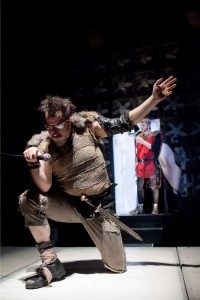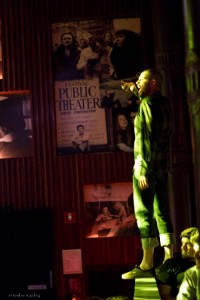Theater Review: Beowulf Unleashed
Reviewed by Chantal Mendes
AF interview with Big Banana & Bodice
Oberon is not the kind of place where you think you are going to learn something about what it means to be human. As you’re sitting at a cocktail table, literally knee to knee with complete strangers, buffeted by an atmosphere of frenetic excitement, Banana Bag & Bodice’s small crew of actors, singers, and musicians take the stage. But the company’s lively, irreverent, and rollicking attitude to the ancient epic Beowulf strips the story down to its meaty core, concentrating on elemental themes of violence and heroism.
The show opens with three players standing at mics introducing the “poem-story” to the audience as if they were giving a lecture. The rapport among the trio is entertaining: they stumble over their words or repeat them to make a point. But this was only a relaxed introduction to the dynamism to come. When Grendel, the monster and villain (or victim in this version of the story) arrives, he’s a creeping, psychotic beast, irritating fellow cast members and stalking through the audience, grabbing drinks and swallowing them in one gulp. Banana Bag & Bodice is serious when it claims it does “playshows”: the emphasis is on play, with the audience becoming part of the hijinks.
The energetic production is punctuated by an assortment of songs ranging from ballads to raucous, bombastic celebrations of Beowulf’s achievements. The band is made up an assortment of trombone players, keyboardists, and drummers, who sit calmly sipping drinks in between songs. The intense music assaults the ears, to the point that you feel as if you were in the middle of battle. You are surrounded by clang and clatter of chaos and tumult.
But the show isn’t all about loud music and dramatic physical performance. Perhaps the most interesting part of the play is the way the three actors who introduce the tale watch throughout, often with mock rapt attention. They only break character to morph into a different figure in the story. Initially, it’s as if a roving band has invaded a poetry reading and decided to wreak havoc by singing at the top of their lungs and generally create anarchy. But then you see how seamlessly the literary triumvirate transform into a part of Beowulf, transforming into Grendel, his mother, and then the dragon. Each actor is versatile and fluid, drifting into one role and then another with ease.
The downside of the anarchy is that the proceedings become a little jumbled at times, but that only serves to keep the audience mentally alert (the drinks can make you a tad fuzzy). “Is that my sanity floating away downriver?” the actors sing at one point, and you wonder the same thing watching the drama unfold, equal parts amused and engrossed in the tale, which, as it turns out, is shockingly funny for a Scandinavian epic from the smoky mead halls and hearths of long ago.
Beowulf in particular contributes to the amusement with his bumbling demeanor. He is intensely full of himself and confident in his prowess yet also flawed and, by the end, contemplating his own humanity and lost youth. At first, he walks around the room in a strange, jerky fashion, subtly mocking the traditional hero image while the chorus sings “it’s that . . . guuuuuuy.” By the time he climbs up on the stage to a drawn out “iiiiiiit’s BEOWULF,” there’s a burst of applause from the excited audience who can’t wait to see what “that guy” has to offer. Which, luckily, is a lot. His lampoon aggression emphasizes the strong expectations that, since this is an epic, the protagonist be “masculinity enhanced.”
Beowulf is dedicated to his role as hero and is as close to a medieval heartthrob as you can get, a self-proclaimed “sexy motherf*cker.” Yet Jason Craig’s performance is masterful in that it also explores the buried question of Grendel’s humanity. “Yours and mine” is a song between King Hrothgar and Beowulf that is all about the monster’s physical similarity to the men themselves. The audience is forced to define what makes a monster. The song turns the stereotypical image around, probing the question of the monster inside all humanity.
While staying surprisingly true to the heart of the story, the small adaptations, tweaks, and interpretations are what make the version memorable. The battle scenes are violent yet farcical: the initial throw down ends in a simple thumb war between the Beowulf and Grendel. The second fight is played out in a mock underwater den, portrayed with the aid of small, portable fish tanks.
Despite the flair with which the scenes are executed, it is less the fighting and more the performers that stand out. Jessica Jelliffe as Grendel’s mother is the true star here. From the moment she let down her hair to mourn the death of Grendel, her performance is riveting because it is so visceral. At one point, Jessica screams out her grief, not as a monster, but as a woman whose only son has literally been torn from her.Although her performance is the standout, the rest of the cast displays enviable chops throughout the show, from the flirty chorus girls to the disturbing Grendel and even the fiery Dragon at the climax, who turns from a meek, bookish, literary nerd into a ferocious, screaming weapon of hate aimed at Beowulf. During their fight scene, her powerful voice gives you chills, especially when she sings in a language that is impossible to understand.
Their battle makes more of a point than the previous two because the tussle begins with an argument about the necessity of violence and youth’s propensity for aggression. Beowulf proclaims “there’s art in violence, there’s violence in youth” as if that explains the need for destruction. And perhaps that is message that Big Banana Bag & Bodice want to make with what it calls the “Beowulf thing.” The “Thousand Years of Baggage” comes down to an electrifying but ironic display of the proud violence of youth, which always assumes it’s in the right. The result consumes a nation but leaves old men longing for their former days of strength and valor.
Tagged: Beowulf, Beowulf -a Thousand Years of Baggage, Big Banana Bag and Bodice, Boston, Oberon




That “language that is impossible to understand” was the original Old English text, which was great to hear sung!
Thanks BW! I figured most people attending the show wouldn’t know that and so I didn’t specify and should have made it clearer that I thought it was a really nice touch!